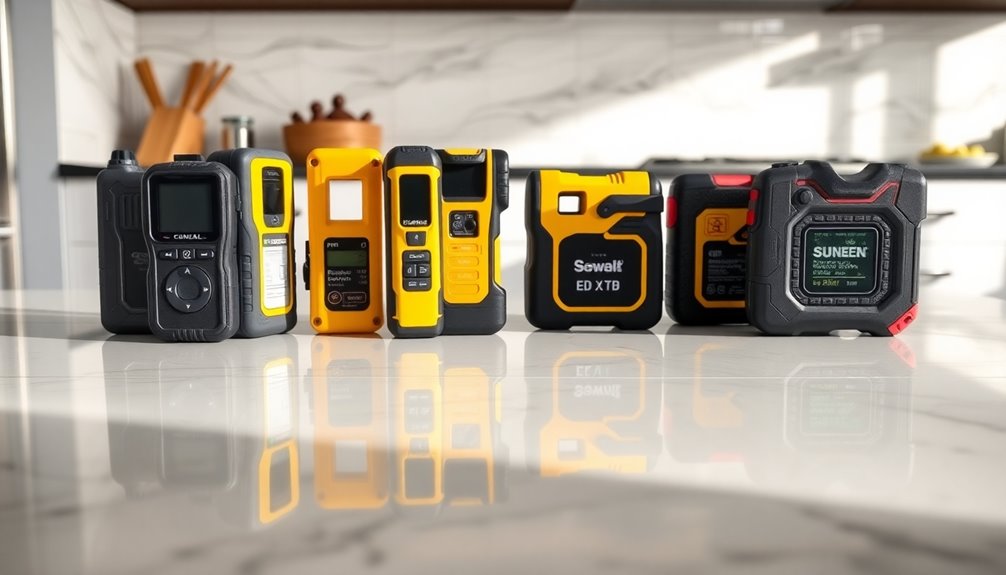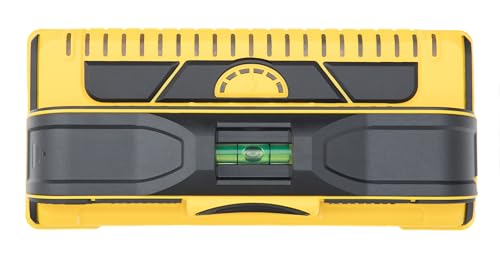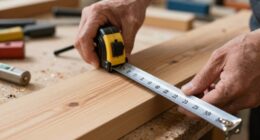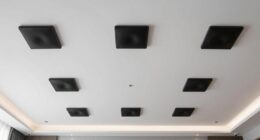When I searched for the best stud finders for tile walls, I discovered that the right tool can really elevate your DIY projects. I recommend looking for features like multiple scanning modes, clear LCD displays, and ergonomic designs for comfort. Models like the Franklin Sensors ProSensor series are great for accurate readings, while 5-in-1 tools offer versatility in detecting various materials. It's essential to evaluate detection depth and calibration needs for peak performance. There's so much to explore in finding the perfect fit for your needs, so let's uncover the top contenders together and make your project a success!
Key Takeaways
- Look for stud finders with multi-sensing technology to detect multiple materials behind tile walls effectively.
- Choose models with deep detection capabilities, ideally over 3 inches, for thicker tile materials.
- Ensure the stud finder has live wire detection features for safety during electrical projects.
- Opt for user-friendly designs with clear LCD displays and audio alerts for easy detection feedback.
- Check customer reviews for reliability and performance, focusing on accuracy and versatility across different wall types.
Franklin Sensors ProSensor M210 Stud Finder
If you're tackling a renovation or DIY project involving tile walls, the Franklin Sensors ProSensor M210 Stud Finder is a game changer. This tool boasts 13 patented sensors that accurately detect studs without any calibration. I love the wide LED display that shows both the center and edges of the studs, making my work so much easier. Plus, it has a live wire meter, ensuring I'm safe from electrical hazards while drilling. Weighing just 11.36 ounces, it's lightweight yet powerful, with a deep scan capability of up to 1.7 inches. Rated highly by users, it's praised for its accuracy and ease of use. If you want a reliable stud finder, this one's definitely worth considering!
Best For: Professionals and DIY enthusiasts looking for an accurate and reliable stud finder for renovation and construction projects.
Pros:
- Accurate detection with 13 patented sensors and no calibration needed.
- Safety feature with integrated live wire meter to alert users of electrical hazards.
- Wide LED display shows both the center and edges of studs for easier identification.
Cons:
- Requires fully charged batteries for optimal performance.
- Some users suggest improvements for the battery compartment design.
- May be less effective on extremely dense materials in certain situations.
Stud Finder Wall Scanner – 5 in 1 Stud Finder Tool
The Stud Finder Wall Scanner – 5 in 1 tool stands out as the best choice for anyone tackling home improvement projects, especially when working with tile walls. This compact device features a microprocessor chip and an HD LCD display, allowing me to accurately detect edges and centers of wood, metal studs, pipes, and live AC wires. With multiple scan modes like stud scan and deep scan, I feel equipped for various materials and depths. The backlit display and audio alerts make it user-friendly, even in dim lighting. Plus, its high sensitivity guarantees I can hang heavy items safely, avoiding hidden hazards. With a solid customer rating, it's clear this tool is a reliable companion for any DIY enthusiast.
Best For: Homeowners, DIY enthusiasts, and professionals looking for a reliable tool to safely locate studs, pipes, and live wires behind walls.
Pros:
- Accurate detection of wood, metal studs, pipes, and live AC wires, with results within a fraction of an inch.
- User-friendly design featuring a backlit LCD display and audio alerts for easy operation in low-light conditions.
- Versatile applications suitable for tasks like hanging shelves, mounting TVs, and ensuring safety while drilling.
Cons:
- Some users report occasional inaccuracies, which may lead to frustration during use.
- May require recalibration for optimal performance after extended use or battery changes.
- Limited depth detection in certain scan modes, potentially affecting performance in thicker walls.
Franklin Sensors ProSensor M150/X990 Stud Finder with Live Wire Detection
For anyone tackling projects on tile walls, the Franklin Sensors ProSensor M150/X990 stud finder stands out with its impressive nine-sensor system, ensuring maximum accuracy in locating studs. Weighing just over five ounces, it's lightweight and easy to handle. I appreciate that it requires no calibration; just turn it on and let it do the work. The precision LEDs display the center and edges of studs, making it simple to find both wood and metal behind drywall. Plus, its live wire detection feature adds an extra layer of safety. With a solid 4.5-star rating from numerous users, it's clear that this tool is a favorite for its accuracy and ease of use. Just remember to use standard AAA batteries!
Best For: DIY enthusiasts and professionals looking for an accurate, easy-to-use stud finder for various wall materials.
Pros:
- High Accuracy: Utilizes nine sensors for precise detection of studs and live wires.
- User-Friendly: No calibration needed; simply turn it on for instant results.
- Versatile Compatibility: Effectively works through drywall and other materials, detecting both wood and metal.
Cons:
- Live Wire Detection Issues: Some users report inconsistent performance with live wire detection.
- Battery Dependency: Requires standard AAA batteries, not compatible with rechargeable options.
- Limited Detection Depth: Maximum detection depth of 1.5 inches may not suffice for all wall types.
Stud Finder Wall Scanner Detector – 5 in 1 Electronic Stud Sensor
Looking to tackle a DIY project on tile walls? The Stud Finder Wall Scanner Detector is a game changer with its 5 in 1 functionality. It detects wood, metal studs, AC wires, and even pipes, making it incredibly versatile. I love the advanced sensors that precisely find edges and centers, plus the five scanning modes for different materials. The bright backlight LCD and audio alerts make it user-friendly, too. Weighing just 8.8 ounces, it's lightweight and durable, designed to resist shocks and dust. It also features continuous wire alerts to prevent accidents. While some reviews mention a learning curve, I believe it's worth the investment for safe, accurate results on any project.
Best For: DIY enthusiasts and homeowners who need a reliable tool for accurately locating studs, wires, and pipes behind walls.
Pros:
- Versatile functionality: Detects wood, metal studs, AC wires, and pipes, making it suitable for various projects.
- User-friendly design: Features a bright backlight LCD and audio alerts for easy operation.
- Durable construction: Shock-resistant and dust-resistant design ensures long-lasting use.
Cons:
- Learning curve: Some users may find it challenging to master all the features initially.
- Mixed reviews on accuracy: Detection effectiveness can vary among users, leading to inconsistent experiences.
- Occasional quality issues: Reports of receiving used items or lacking instructions may affect customer satisfaction.
WALABOT DIY 2 – Advanced Stud Finder and Wall Scanner for Smartphones
When it comes to tackling projects involving tile walls, the WALABOT DIY 2 stands out as an innovative tool that merges technology with practicality. This advanced stud finder connects to my smartphone, letting me visually identify the center of wood and metal studs while also detecting pipes and wires. I love that it can scan up to 4 inches deep, which adds confidence when drilling. The setup is straightforward, and the visual interface is incredibly detailed, giving me a clear view of what's behind the walls. However, I've noticed that performance can vary based on wall thickness and materials. Overall, I'd recommend the WALABOT DIY 2 for anyone looking to enhance their home improvement projects.
Best For: DIY enthusiasts and professionals who need a reliable tool for accurately locating studs, pipes, and wires in walls.
Pros:
- Accurate and reliable detection of wood and metal studs, wires, and pipes, enhancing confidence during installations.
- User-friendly setup and a detailed visual interface on smartphones make it easy to use for all skill levels.
- Portable design with internal Wi-Fi connectivity allows for scanning without relying on external internet access.
Cons:
- Performance may vary based on wall thickness and materials, potentially limiting effectiveness in certain situations.
- Calibration required when moving the device can be time-consuming and may frustrate some users.
- Compatibility issues may arise with older smartphones, affecting the overall user experience.
DEWALT Stud Finder (DW0100)
The DEWALT Stud Finder (DW0100) stands out with its center-find technology, making it an excellent choice for DIY enthusiasts and professionals tackling projects on tile walls. With a detection depth of 3/4 inch for both wood and metal, it gives you reliable results. I appreciate its constant auto-calibration and the audible alerts combined with LED arrows for easy navigation. The center marking channel simplifies marking, while its slim profile makes storage a breeze. Users generally report an accuracy of 90-95%, although results can vary with uneven wall textures. Despite some reliability concerns, I find it a solid tool, especially with a three-year warranty and included batteries for immediate use. Overall, it's a good value for the price.
Best For: DIY enthusiasts and professionals seeking an effective stud finder for various wall types, including drywall and tile.
Pros:
- Center-find technology ensures accurate stud center detection.
- Audible alerts and LED indicators provide clear guidance during use.
- Compact design allows for easy handling and storage.
Cons:
- Inconsistent readings can occur with uneven wall textures or multiple materials.
- Some users reported reliability issues leading to product returns.
- Instructions may be unclear for some users, particularly regarding sensitivity and operation.
Stud Finder Wall Scanner, 5 in 1 Multifunction Stud Locator
For those tackling DIY projects involving tile walls, the Stud Finder Wall Scanner, 5 in 1 Multifunction Stud Locator is an essential tool due to its advanced multi-sensing technology. Weighing just 9.6 ounces and featuring an ergonomic design, it fits comfortably in my hand. With five scanning modes, I can easily locate metal, studs, pipes, and live AC wires. The backlit LCD display shows the material type and position clearly, while the continuous beeping sound keeps me informed during the search. Users appreciate its accuracy, but I've found it's vital to follow the manual and avoid scanning too quickly to prevent false positives. Overall, this scanner has truly simplified my home improvement tasks.
Best For: DIY enthusiasts and homeowners looking for an efficient tool to locate studs, metal, pipes, and live wires in various wall types.
Pros:
- Accurate detection of studs, metal, pipes, and live AC wires with multi-sensing technology.
- Ergonomic design and lightweight construction enhance comfort during use.
- Backlit LCD display provides clear visibility of material type and position.
Cons:
- Calibration issues may arise if the tool is not used correctly or at the right speed.
- Some users report false positives when scanning too quickly.
- Inconsistent wire detection can occur in certain conditions.
Stud Finder Wall Scanner – 5 in 1 Tool
Equipped with an intelligent microprocessor chip and a bright HD LCD display, the Stud Finder Wall Scanner – 5 in 1 tool is a game changer for both DIY enthusiasts and professionals tackling tile wall projects. This versatile tool detects edges and centers of wood and metal studs, joists, pipes, and live AC wires, ensuring I can work safely and efficiently. With scan modes for various materials and depths, it's perfect for diverse applications. The backlit display is easy to read, even in low-light conditions, while the ergonomic design makes it comfortable to use. Though some users report mixed accuracy, I find it invaluable for hanging shelves and mounting TVs, preventing accidents and costly repairs.
Best For: The Stud Finder Wall Scanner – 5 in 1 tool is best for DIY enthusiasts, homeowners, and professionals looking to safely locate studs, pipes, and live wires behind walls.
Pros:
- Versatile functionality: Detects wood, metal studs, joists, pipes, and live AC wires, making it suitable for various projects.
- User-friendly design: Ergonomic shape and bright backlit LCD display enhance comfort and visibility during use.
- Safety features: Helps prevent accidents by accurately locating live wires and pipes, reducing the risk of damage and costly repairs.
Cons:
- Mixed accuracy reports: Some users experience inconsistencies in detection accuracy compared to other models.
- Calibration required: Users must calibrate the tool correctly for different materials, which may be confusing for some.
- Customer reviews vary: While many find it valuable, others express dissatisfaction with its reliability and performance.
Stud Finder Wall Scanner Detector (6 in 1)
Looking for a reliable tool to tackle your next DIY project? The Stud Finder Wall Scanner Detector (6 in 1) might just be what you need. With its upgraded Smart Sensor HD LCD, it accurately detects the center and edge of wood, metal, and AC wires. I love how it offers various detection modes that can scan up to 3.15 inches deep, making it versatile for different materials. The audio alerts and signal bar on the display guide you right to the studs, which I find incredibly helpful. It's compact and battery-powered, ensuring I can easily carry it around. While it excels in finding studs, just be cautious with electrical wire detection, as some users reported inconsistencies.
Best For: DIY enthusiasts and homeowners looking for a reliable tool to locate studs and edges in walls.
Pros:
- Precise Detection: Advanced technology provides accurate readings for wood, metal, and AC wires.
- User-Friendly: Large LCD display with audio alerts makes it easy to locate studs.
- Portable Design: Compact and battery-powered, perfect for on-the-go projects.
Cons:
- Inconsistent Wire Detection: Some users reported inaccuracies when detecting electrical wires.
- Possible Missed Studs: A few users experienced missed readings for studs.
- Limited Depth for Certain Materials: Detection capabilities may not reach deeper materials effectively.
Zircon StudSensor A150 Wall Scanner and Stud Finder
The Zircon StudSensor A150 Wall Scanner stands out as a top choice for DIY enthusiasts and professionals alike, thanks to its impressive WireWarning detection feature. This tool not only locates studs with ease but also detects live electrical wires up to 2 inches deep, ensuring safety during your projects. Its ergonomic design makes it comfortable to hold, and the LCD display clearly shows signal strength and stud positions. With a scanning depth of 1.5 inches in DeepScan Mode, I find it reliable for various tasks, from hanging shelves to mounting TVs. While some users mention visibility issues with the display, I appreciate its accuracy and ease of use, making it a valuable addition to my toolkit.
Best For: DIY enthusiasts and professionals looking for a reliable stud finder with wire detection capabilities.
Pros:
- Accurate and easy to use, making it suitable for various tasks such as hanging shelves and mounting TVs.
- Ergonomic rubber grip provides comfort and a secure hold during operation.
- WireWarning detection enhances safety by identifying live electrical wires up to 2 inches deep.
Cons:
- Some users report visibility issues with the display, making it hard to read in certain lighting conditions.
- The tool can be considered bulky, which may affect maneuverability in tight spaces.
- There are claims of inconsistent edge detection and variable wire detection effectiveness in different materials.
Mecurate Stud Finder Wall Scanner Sensor – 5 in 1 Electronic Stud Detection
If you're tackling a DIY project that involves mounting items on tile walls, the Mecurate Stud Finder Wall Scanner Sensor stands out thanks to its ability to detect wood, metal, live wires, and pipes—all essential for safely securing your fixtures. I love how it features a self-calibration system, ensuring accuracy no matter the wall type. With five scanning modes, including two for wood and one for metal, it's versatile enough for any job. The LCD screen and audible alerts make it user-friendly, especially in low light. Plus, it comes with a 9V battery and a dustproof bag. With a solid customer rating of 4.3 stars, it's a reliable choice for any DIY enthusiast like me.
Best For: DIY enthusiasts and homeowners looking for a reliable and versatile stud finder for various wall types.
Pros:
- User-friendly design with an LCD screen, audible alerts, and a backlit display for easy visibility in low-light conditions.
- Versatile scanning modes that allow detection of wood, metal, live wires, and pipes, making it suitable for a variety of projects.
- Includes essential accessories such as a 9V battery and dustproof bag, enhancing convenience and portability.
Cons:
- Some users report inconsistent performance on certain wall types, which may affect accuracy.
- The reliance on a 9V battery may require periodic replacements, adding to maintenance.
- Complex wall materials may pose challenges for detection, potentially leading to frustration in specific DIY tasks.
Stud Finder – 5 in 1 Electronic Wall Scanner
For anyone tackling projects involving tile walls, the USTUDCHY 5 in 1 Electronic Wall Scanner stands out as an essential tool. This device features an advanced sensor chip that accurately detects metal pipes, studs, wooden frames, and even live wires. With five scan modes, it allows me to easily identify what's behind my walls, floors, or ceilings. The large LCD display and sound alarm make it user-friendly, while the ergonomic handle guarantees I can use it comfortably for extended periods. I appreciate the AC scan mode that alerts me to any live wires, keeping my projects safe. Plus, the positive customer feedback and quality assurance make it a reliable choice for both DIY enthusiasts and professionals alike.
Best For: Professionals, homeowners, and DIY enthusiasts looking for a reliable tool to detect hidden structures behind walls, floors, and ceilings.
Pros:
- Accurate detection of metal pipes, studs, wooden frames, and live wires.
- User-friendly features including a large LCD display, sound alarm, and ergonomic anti-slip handle.
- Versatile with five scan modes to suit various project needs.
Cons:
- May require calibration for optimal accuracy in certain conditions.
- Battery life may vary depending on usage frequency.
- Some users may find the learning curve steep for switching between scan modes.
Stud Finder Wall Scanner with Magnetic Sensor (2025 Upgraded 6-in-1 Tool)
Home improvement enthusiasts will find the CUBETA Wall Stud Finder, a 2025 upgraded 6-in-1 tool, to be an invaluable asset. It effortlessly detects wood, metal studs, AC wires, and pipes, offering six detection modes for various depths and materials. I love how its advanced self-calibration AI chip guarantees accurate results, adapting seamlessly to different wall types. The vibrant backlit LCD screen displays crucial information, while audio alerts and a three-color LED indicator keep me informed, even in dim lighting. Lightweight and portable, it's perfect for hanging pictures or mounting TVs. Customers rave about its ease of use and reliable performance, making it a fantastic gift for anyone passionate about DIY projects. Trust me, you won't regret adding this tool to your arsenal!
Best For: Home improvement enthusiasts and DIYers looking for an accurate and versatile stud finder for various projects.
Pros:
- Accurate detection: Advanced self-calibration AI chip ensures reliable results on different wall materials.
- Multiple modes: Six detection modes for wood, metal, live wires, and pipes enhance versatility.
- User-friendly interface: Vibrant backlit LCD, audio alerts, and LED indicators make it easy to use in low-light conditions.
Cons:
- Battery dependency: Requires a 9V battery, which may need replacement during extensive use.
- Learning curve: Some users may need time to familiarize themselves with all detection modes.
- Limited depth detection: Certain modes may not detect materials beyond specified depth limits.
Zircon MultiScanner A250c All-In-One Stud Finder and Metal Detector
The Zircon MultiScanner A250c stands out as an excellent choice for anyone tackling projects on tile walls, thanks to its advanced scanning capabilities that include live wire detection and metal scanning features. Weighing just 12.6 ounces, its ergonomic grip makes it comfortable to use at any angle. The multicolor LCD screen provides clear indicators for different scanning modes, including StudScan and DeepScan. I appreciate its Auto Correcting Technology, which helps minimize user errors. Plus, the WireWarning Detection alerts me to live wires, ensuring safety during my projects. While some users find it a bit bulky, the accuracy and versatility make it a valuable tool for both DIY enthusiasts and professionals alike.
Best For: The Zircon MultiScanner A250c is best for DIY enthusiasts and professionals looking for an accurate and versatile tool for stud finding and metal detection.
Pros:
- Accurate stud detection with clear indicators for stud center.
- Ergonomic design and lightweight for comfortable use at any angle.
- Features like WireWarning Detection and Auto Correcting Technology enhance safety and minimize user errors.
Cons:
- Some users may find the size a bit bulky.
- Occasional false readings can occur during scanning.
- Performance improvements over older models may not be significant for some users.
Stud Finder Wall Scanner (6-in-1 Tool for Detecting Drywall Stud Centers)
When tackling projects involving tile walls, the Stud Finder Wall Scanner stands out for its impressive 6-in-1 functionality, making it an essential tool for both novice and experienced DIY enthusiasts. This upgraded tool, weighing just 8.4 ounces, easily detects wooden and metal studs, live wires, and even pipes. With three detection depths for studs and a clear HD LCD display, I find it incredibly user-friendly. The ergonomic design guarantees comfort during extended use, and the safety features keep me from accidentally drilling into electrical lines. Plus, it comes with two AAA batteries, so I can start using it right away. Overall, it's a reliable companion for any home improvement project, offering peace of mind when securing fixtures.
Best For: The Stud Finder Wall Scanner is best for DIY enthusiasts and homeowners looking for a reliable tool to accurately locate studs, wires, and pipes for home improvement projects.
Pros:
- Accurate detection of wooden and metal studs, ensuring secure installations.
- User-friendly design with an HD LCD display and ergonomic shape for comfort.
- Safety features that help prevent accidental drilling into electrical wires or pipes.
Cons:
- Some users report inconsistent detection accuracy, particularly with wood studs through drywall.
- May require calibration before use for optimal performance.
- Limited effectiveness on thicker walls or unique wall materials, which may not be compatible with standard detection methods.
Factors to Consider When Choosing a Stud Finder for Tile Walls

When I'm picking a stud finder for tile walls, I always consider a few key factors. Detection depth and material compatibility are essential, as I need a tool that works effectively with my specific wall type. Plus, features like calibration, accuracy, and safety can really make a difference in my overall experience.
Detection Depth Capability
Choosing the right stud finder for tile walls hinges considerably on its detection depth capability. I've found that this feature is critical for accurately locating studs hidden behind thicker materials. Standard detection depths usually range from 1.5 to 2.5 inches, but many stud finders specify their maximum capabilities, with some reaching up to 3 inches or more.
When it comes to tile walls, the complexity increases. Thicker tiles or additional wall layers can make detection challenging, so you'll want a finder with strong sensitivity and the ability to adapt to different material densities. I recommend looking for a model that offers a reliable deep scan mode, as this will enhance accuracy and help you avoid damaging your walls when drilling.
Having a stud finder with a deeper detection capability not only helps in identifying studs but also makes it versatile for various renovation and installation projects. By keeping these factors in mind, you'll be better equipped to choose a stud finder that meets your needs, ensuring that you get the job done right without unnecessary hassles.
Material Compatibility Considerations
Selecting the right stud finder for tile walls requires careful attention to material compatibility. You'll want a device that can effectively penetrate tile to detect underlying materials like wood or metal studs. Not all stud finders are created equal; some might struggle to get through that extra layer of tile, resulting in inaccurate readings.
It's crucial to look for stud finders with adjustable sensitivity settings. Tile thickness can vary considerably, affecting how accurately the device detects studs. I recommend choosing a model that offers deep scan capabilities, ideally up to 1.5 inches, to guarantee it can account for any additional material between the tile and the studs.
Safety is also a priority, so consider a stud finder with live wire detection features. This will give you peace of mind while drilling into walls that may have hidden electrical wiring beneath the tiles. Finally, opt for devices that offer multiple scan modes to accommodate different wall compositions, whether it's drywall or cement board. By considering these factors, you'll be better equipped to choose a stud finder that meets your needs for tile walls and enhances your project's success.
User-Friendly Features
While a stud finder's primary function is to detect underlying materials, its user-friendly features can make a significant difference in your experience. A clear LCD display is crucial; it should show detection status and depth, making results easy to read, especially in dimly lit areas. I appreciate when stud finders incorporate audio alerts; they provide immediate feedback when detecting studs, wires, or pipes, guiding me through the process.
Ergonomic design is another important factor. A non-slip grip guarantees comfortable handling, allowing me to operate the device for extended periods without fatigue. I've found that a simple calibration process is essential, too. It's much easier when I can quickly calibrate by placing the device flat against the wall, ensuring accuracy from the start.
Light indicators or color-coded displays also help in interpreting detection results. They clearly show the type and location of materials behind the wall, making my job more efficient. All these user-friendly features enhance my overall experience and help me achieve better results when finding studs in tile walls.
Calibration and Accuracy
User-friendly features enhance the overall experience of using a stud finder, but calibration and accuracy play an essential role in achieving reliable results, especially on tile walls. I've learned that proper calibration is vital for accurate detection. Typically, you need to place the stud finder flat against the wall and initiate a calibration process before you start searching for studs.
I've noticed that the accuracy of stud finders can vary considerably. Advanced models often provide precision within a fraction of an inch, which is essential for tasks like hanging heavy items. Some of the best stud finders come equipped with automatic calibration that adapts to different wall materials, enhancing reliability when detecting studs behind tile.
However, it's important to remember that wall thickness and material can affect detection performance, particularly with tiled surfaces that may interfere with signal penetration. I've found that many stud finders offer multiple scan modes, allowing you to select the most appropriate setting based on the wall type and the depth of the object you're locating. This versatility is key for achieving the best results on tile walls.
Safety Features Importance
When choosing a stud finder for tile walls, safety features are essential to guarantee a smooth and secure installation process. I can't stress enough how important live wire detection is. It alerts us to potential electrical hazards lurking behind those walls, greatly reducing the risk of accidental electrocution while drilling.
Many stud finders now come with audio alerts and visual indicators, which signal the presence of live wires or plumbing. This feature has saved me from costly damage during home improvement projects more times than I can count. The integrated safety mechanisms make sure I'm warned before I accidentally drill into hidden electrical wires or pipes, especially important in homes with complex wiring layouts.
Having robust safety features not only enhances my confidence but also allows me to work more safely, whether I'm a DIY enthusiast or a professional. When working with tile walls, the stakes are higher; drilling without knowing what lies beneath can easily lead to shattered tiles and dangerous situations. So, prioritize safety features when selecting your stud finder. It's a small investment for peace of mind!
Portability and Design
After guaranteeing safety features are in place, the next thing I consider is the portability and design of the stud finder. When I'm choosing a tool for tile walls, I always look for lightweight and portable designs. This makes handling and maneuvering during use much easier, especially in tight spaces. An ergonomic design with a non-slip grip is vital for comfort during extended scanning sessions on hard surfaces like tile.
Compact dimensions also catch my eye. A smaller tool fits perfectly in my toolbox and is easy to transport to different job sites. I also prefer devices that have a backlit display. This feature improves visibility in low-light conditions, which is particularly important when I'm working in areas with limited lighting.
Durability is another important factor for me. I want a stud finder that can withstand the impacts and vibrations that come with working on tough tile surfaces. By focusing on portability and design, I guarantee I choose a stud finder that's not only effective but also comfortable and convenient to use. This helps me tackle any project with confidence and efficiency.
Frequently Asked Questions
Can Stud Finders Be Used on Concrete Tile Walls?
I've found that stud finders can be a bit tricky on concrete tile walls. While some models work well, others struggle to detect studs through the dense material. I usually test a few different types to see which one gives the best results. It's worth noting that magnetic stud finders tend to perform better on tile walls, as they can locate screws and nails more easily. Give it a try, and see what works for you!
How Do I Calibrate My Stud Finder?
Calibrating my stud finder is pretty straightforward. First, I make sure it's on a flat, non-textured surface. Then, I turn it on and wait for the calibration signal, which usually involves a beep or light indicator. Once it's ready, I can start scanning. I always remember to keep the finder flat against the wall for the most accurate readings. It's essential for finding those hidden studs without any hassle!
Are There Stud Finders Specifically for Metal Studs?
Finding the right tool is like searching for buried treasure. Yes, there are stud finders specifically designed for metal studs. I've used a few, and they work by detecting the magnetic field generated by the metal. These stud finders usually have settings to distinguish between wood and metal, making it easier to locate those elusive metal studs. Trust me, investing in one of these can save you a lot of time and frustration during your projects.
What Is the Typical Battery Life of These Stud Finders?
When I think about the typical battery life of stud finders, I find it varies quite a bit. Most models last anywhere from 20 to 50 hours of continuous use on a single set of batteries. I've noticed that factors like the type of battery and how often I use the device can really impact this. It's always a good idea to keep a spare set handy, just in case!
How Accurate Are Stud Finders on Textured Tile Surfaces?
I know you might think that textured tile surfaces make stud finding a hassle, but I've found that many stud finders actually perform quite well. When I use them on textured tiles, I make certain the tool's sensitivity is adjusted correctly. This way, I get accurate readings without too much fuss. While results can vary, I've had success with several models, so don't let the texture deter you from getting the job done!
Conclusion
Finding the right stud finder for tile walls is like hunting for buried treasure; you need the right tools to uncover valuable rewards. I once spent hours searching for a stud behind a tiled wall, only to discover I was using the wrong tool. The frustration was real! With the right stud finder in hand, you'll not only save time but also guarantee your projects go smoothly. So, choose wisely and dig deep—you'll strike gold!

























